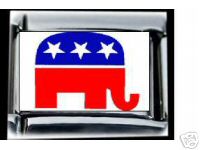Open Letter to Rush Limbaugh
Dear Mr. Limbaugh;
Today was the first time I've ever heard your radio show and I am shocked -- shocked, I say --and disappointed in you. In your answer to the FairTax question it was painfully obvious that you did not know what you were talking about. Obviously you don't understand the situation.
You support a flat tax. That's what we had to begin with, and look where we are now. A flat tax is an INCOME tax. It taxes productivity. It has to have exemptions and exceptions and incentives to make it work, and once you add those, it's not FAIR to someone -- historically that's us guys in the middle. AND the flat tax is on top of an income tax. That's really close to the VAT that has decimated European economies.
You said, "The Home Mortgage Interest Deduction - now a lot of people, because it's been around for so long, it … it's so important, that's one of the reasons that some people buy a house - only to get the deduction on a mortgage. "Ah, I can save a lot of money!" But, Mr. Limbaugh, to get that deduction, you have to itemize your taxes and 3/4 of the taxpayers don't bother to do that.
Besides, people buy homes for emotional reasons, not financial ones. A house or yard reminds them of their childhood home or they want to personalize with paint and shelves and they can't do that in a rental. The build up of equity is a nice little extra but the tax incentive does not motivate them AND that incentive is unfair to renters -- retirees, for example, who can't keep up a big yard any more and rent an apartment for something smaller with no upkeep. That's regressive.
Here's what you need to know: The progressive FairTax proposal is the only one extant that was developed by top-notch American economists (Harvard, MIT, Rice, Stanford and more) over a decade of study, taking into consideration not only the national economy but the will of the American taxpayer. It is NOT a Value
Added tax or a flat tax.
It is the only proposal that repeals the current income tax, social security tax, employment taxes and corporate taxes, among others and yet funds the government at present levels. By removing Federal taxes it lowers retail prices by the 20% to 30% manufacturers and retailers now add to prices of goods to pay their taxes.
The FairTax gives every American 100% of his or her pay- or pension check.
Each American with a social security card (children, too) receives a monthly stipend to assure that s/he does not pay tax on necessities up to the poverty level; thus the poor pay no tax and the wealthy pay their share. (The wealthy buy more expensive things than the rest of us.)
The FairTax is on new goods and services only and the price of those goods and services stays approximately the same because of the removal of the aforementioned embedded taxes. It is not assessed on charitable gifts or contributions. There are no exemptions or so-called "incentives" in the
FairTax, or it would not be fair! One man's incentive is another's disadvantage in taxation.
The FairTax is a progressive tax that expands the tax base and fertilizes the economy. Because we pay only when we buy, the wealthy pay more (since they tend to buy couture dresses instead of Target specials, limousines and Jaguars instead of Toyotas and Hondas, two or three mansions instead of a
small house in the suburbs, etc.) and since people who can afford it prefer quality to economy and half the fun of having money is showing off, it's highly unlikely that they will change. Heck, if they wanted to save money,
they could by buying at WalMart now!
The FairTax brings the $350 BILLION the IRS says it loses to tax evaders annually (that's $2,000 extra each of us pays to make up for the slackers) into the economy, along with the 6 TRILLION dollar criminal, drug and porn dealer underground economies. Illegal immigrants and 40 million foreign tourists annually will pay into the tax base. The FairTax makes the USA the only country in the world that does not tax productivity -- opening us up to foreign investment as well as bringing home those outsourced jobs.
The biggest argument against the FairTax is that people believe Congress will never support and it would take too long to repeal the 16th Amendment. Congress will act if their constituents demand it of them -- remember the suffragettes? (Well, we're too young, but we've heard of them.) Congress also passed prohibition, then repealed it. Besides, the FairTax would give Congress more money to play with. They use money for power and they'd have more of it with FairTax. What's bad about that from their point of view. They could fix the national highway system, provide better pay to keep soldiers' families off of food stamps and give each family that $100,000 for each soldier killed or even missing in action. And National Health Care -- OR they could lower the FairTax rate. Maybe all of the above!
As for the 16th, it doesn't need to be repealed until after the FairTax is passed. It speaks only to the apportionment of taxes; once the income tax and the tax code are gone, the 16th will be easy. Remember when Congress decided to lower the voting age to 18? (We ARE old enough to remember that
one!) They got that ratified in 8 months. It CAN be done and you, too, can decide how to spend, save or invest ALL of your income.
Call me if you'd like to talk about it.
Sincerely,
Sunnye Tiedemann
Read More Here!



